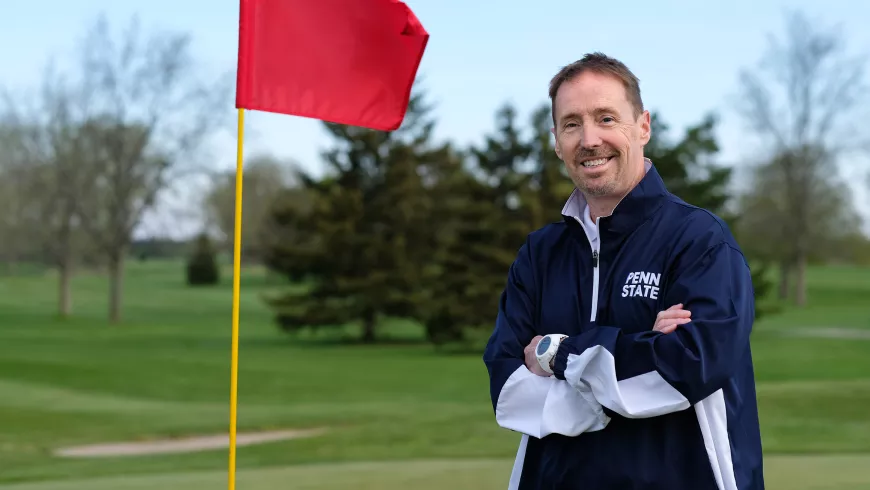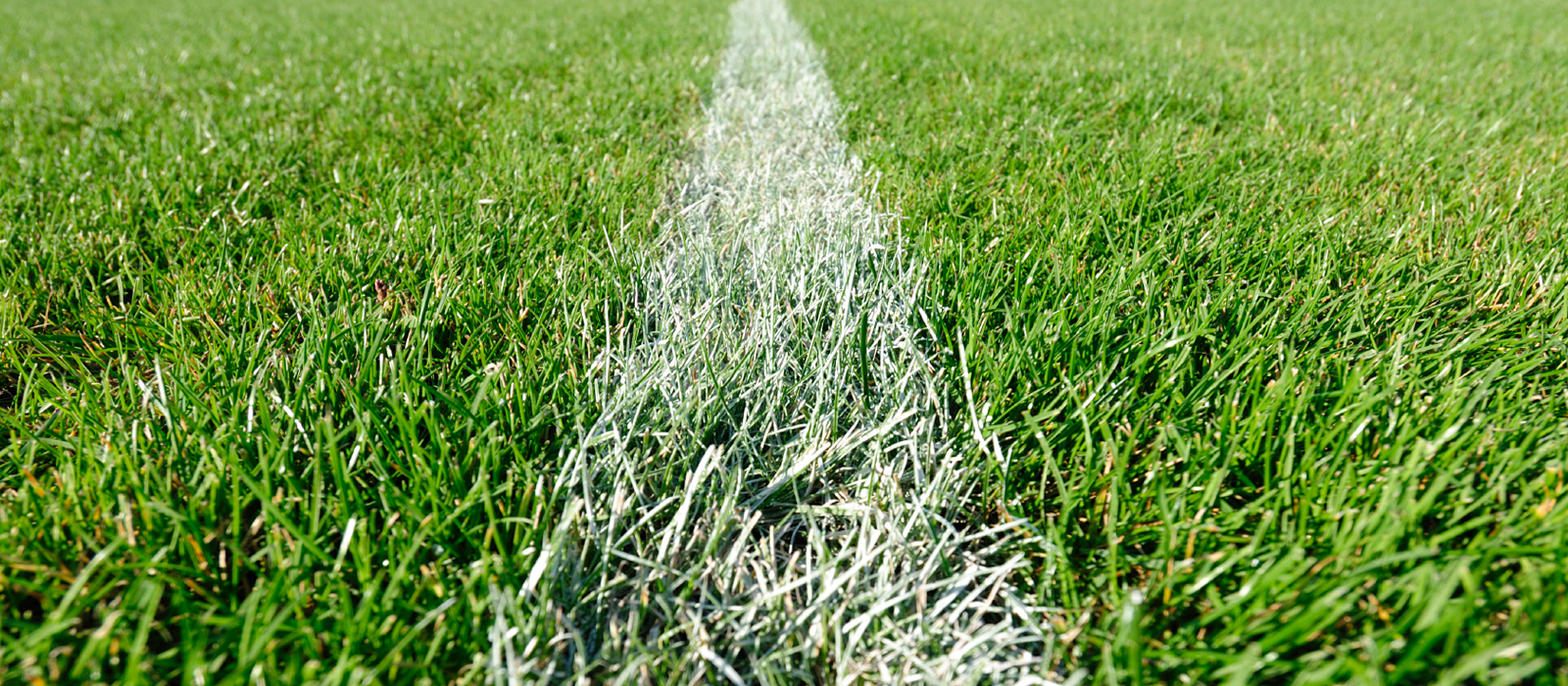Application deadline
Credits and costs
Hands-On Experience
Receive real-world experience through an internship.
Gain Skills to Grow as a Turfgrass Professional
Manage a diverse staff and budgetary limitations.
Identify common turfgrass pests and develop cultural and chemical management plans for each.
Comprehend and draw appropriate inferences from numeric data and quantitative models.
Identify, establish, and maintain grasses in various climates and manage turfgrass under various conditions by making scientific decisions using the fundamentals of plant and soil sciences.
Study in a Variety of Online Courses
Study in a Variety of Online Courses
This 30-credit program of study builds on the basic turfgrass management certificate. Courses in this program cover:
- pest management
- turfgrass cultural systems
- turfgrass edaphology
- case studies in turfgrass management
While the stated requirement for this certificate is 30 credits, it may be slightly less, depending on the circumstances.
- For students with valid state pesticide licenses who have exempted from taking TURF 230, or for students who choose courses other than the 4-credit TURF 435, the total requirement is 29 credits.
- For those students who are both exempt from taking TURF 230 and who choose to take courses other than the 4-credit TURF 435, the requirement for the advanced certificate is only 28 credits.
Note: Students must earn at least a C grade in each course to be eligible for the certificate.
For this program, listed course prerequisites may be waived by the course instructor if you can demonstrate the required level of competency. Contact your adviser at [email protected] for more information.
Prescribed Courses (8 credits)
- 1credit
Covers chemical toxicity, formulations, environmental fate, labels, MSDS, calibration, IPM, safety, handling, storage, and Pennsylvania certification and regulations.
- Note
Students who have a valid (and verifiable) state pesticide license can request to be exempted from taking TURF 230.
- 3credits
Characterization of the primary plant species used for sports, lawn and utility turf; includes turfgrass morphology, environmental adaptation, and cultural requirements.
- 1credit
Oral presentations developed by students in consultation with the course instructor.
- Prerequisite
Seventh-semester standing
- Note
TURF 495 must be taken before scheduling this course.
- 3credits
Supervised off-campus, nongroup instruction including field experiences, practica, or internships. Written and oral critique of activity required.
- Prerequisite
Prior approval of proposed assignment by instructor
Additional Courses (21–22 credits)
- 3credits
Introduction to entomology and management of insect pests of cold- and warm-season turfgrass.
- Prerequisite Concurrent
TURF 235
- 3credits
Introduction to biology of turfgrass pathogens and management of cool- and warm-season turfgrass.
- Prerequisite
TURF 235
- 3credits
A study of soil properties and processes and relationships to land use, plant growth, environmental quality, and society.
- 3credits
Introduction to the development of integrated weed management strategies utilizing a variety of cultural and chemical methods.
- 3credits
A study of irrigation topics with a strong concentration on turfgrass irrigation applications and a focus on surface and subsurface drainage.
- Prerequisite
TURF 235
- Recommend preparation
MATH 21 and SOILS 101
- Note
PLANT 217 may not be substituted for TURF 307 for prescribed course credit.
- 3credits
A study of turfgrass maintenance practices and how their interrelationships can be utilized to develop management systems.
- Prerequisite
TURF 235
- Recommended preparation
SOILS 101
- 3credits
Characterization of soil's physical and chemical properties for the establishment and maintenance of sports turf; includes root zone construction.
- Prerequisite
TURF 235
- Recommend preparation
SOILS 101
- 4credits
Study of turfgrass nutrition and growth; emphasizing constructed and mineral soil fertility, nutrient uptake and function, and fertilizer-use efficiency.
- Prerequisite
TURF 235
- Recommended preparation
SOILS 101
- 3credits
Case study and discussion considering integrated management of selected turfgrass sites; emphasis on problem analysis, principle application, and decision-making.
- Prerequisite
TURF 235 and (TURF 434 or TURF 435)
- Recommended preparation
TURF 238 and TURF 425
Course Availability
If you're ready to see when your courses will be offered, visit our public LionPATH course search (opens in new window) to start planning ahead.
Start or Advance Your Career

Start or Advance Your Career
You can use the knowledge gained from this program and the support of Penn State career resources to pursue careers in a variety of fields, depending on your goals.
Career Opportunities for Graduates
The certificate program was created for golf course and sports field personnel who want to take theirs career to the next level. With an advanced certificate, you can work in a variety of positions, including:
- equipment manager
- commercial grounds manager
- irrigation specialist
- assistant manager
Career Services to Set You Up for Success

From the day you're accepted as a student, you can access resources and tools provided by Penn State World Campus Career Services to further your career. These resources are beneficial whether you're searching for a job or advancing in an established career.
- Opportunities to connect with employers
- Career counselor/coach support
- Occupation and salary information
- Internships
- Graduate school resources
Upcoming Events
Ready to Learn More?
Get the resources you need to make informed decisions about your education. Request information on this program and other programs of interest by completing this form.
Ready to take the next step toward your Penn State undergraduate certificate?
Costs and Financial Aid
Costs and Financial Aid
Learn about this program's tuition, fees, scholarship opportunities, grants, payment options, and military benefits.
Costs and Financial Aid
Undergraduate Tuition
Undergraduate tuition is calculated based on the number of credits for which you register and the number of total credits you have accrued at or transferred to Penn State.
Tuition is due shortly after each semester begins and rates are assessed every semester of enrollment.
2024–25 Academic Year Rates
| How many credits do you plan to take per semester? | If you have 59 or fewer credits | If you have 60 or more credits |
|---|---|---|
| 11 or fewer | $632 per credit | $678 per credit |
| 12–19 | $7,678 per semester | $8,288 per semester |
2025–26 Academic Year Rates
| How many credits do you plan to take per semester? | If you have 59 or fewer credits | If you have 60 or more credits |
|---|---|---|
| 11 or fewer | $638 per credit | $685 per credit |
| 12–19 | $7,755 per semester | $8,371 per semester |
Undergraduate students taking more than 19 credits will be charged the flat tuition rate plus the regular per credit hour rate for each credit above 19.
Paying for Your Certificate
Students pursuing a certificate are considered "nondegree," a status that is not eligible for federal student aid, including the Federal Direct Stafford Loan program. A private alternative loan may be an option to consider.
Additionally, Penn State offers many ways to pay for your education, including an installment plan and third-party payments. Penn State World Campus also offers an Employer Reimbursement and Tuition Deferment Plan. Learn more about the options for paying for your education.
Students pursuing a degree and meeting all other eligibility requirements may qualify for financial aid.
Military Benefits
Military service members, veterans, and their spouses or dependents should explore these potential military education benefits and financial aid opportunities, as well.
Additional Cost of Attendance Details
To view the detailed list of cost of attendance elements:
- visit the Tuition Information site
- click the plus sign to expand the table
- select a semester from the World Campus row
A Head Start toward a Degree

A Head Start toward a Degree
Not only can this program help create opportunities in your career, it can also give you a solid head start toward a full associate or bachelor’s degree.
Degree Programs Related to This Certificate
As a graduate of the advanced certificate program, you can apply the credits you’ve earned to the following Penn State World Campus degree programs:
Learn to plan and implement projects, communicate effectively, conduct training programs, and manage finances in this online degree program designed for those interested in or already working in the turf industry.
Learn more about the Associate in Science in Turfgrass Science and ManagementBegin your career in turfgrass management with a comprehensive education in pest and disease identification and management, soil science, and other horticultural processes. Learn the fundamental operations of golf courses, athletic fields and sports turf, parks, and other related turf industries.
Learn more about the Bachelor of Science in Turfgrass ScienceA Legacy in Turfgrass Education
Penn State launched one of the first turfgrass programs in 1929. As the first university to offer a two-year program for golf course superintendents, and the first to offer a major in turfgrass science, we built a solid foundation for the turfgrass management programs offered through World Campus.
Who Should Apply?
If you have a bachelor's degree in another field or would like to expand your current role in the turfgrass profession, this certificate can provide you with the foundation of knowledge required to maintain and manage any sports or turfgrass facility.
Set Your Own Pace

Set Your Own Pace
Whether you are looking to finish your program as quickly as possible or balance your studies with your busy life, Penn State World Campus can help you achieve your education goals. Many students take one or two courses per semester.
Our online courses typically follow a 12- to 15-week semester cycle, and there are three semesters per year (spring, summer, and fall). If you plan to take a heavy course load, you should expect your course work to be your primary focus and discuss your schedule with your academic adviser.
To Finish Your Certificate in One to Two Years
- Take 3–4 courses each semester
To Finish Your Certificate in Two or Three Years
- Take 2 courses each semester
To Finish Your Certificate in Three or Four Years
- Take 1 course each semester
Timelines may vary based on course availability.
Convenient Online Format
This program's convenient online format gives you the flexibility you need to study around your busy schedule. You can skip the lengthy commute without sacrificing the quality of your education and prepare yourself for more rewarding career opportunities without leaving your home.
A Trusted Leader in Online Education

Penn State has a history of more than 100 years of distance education, and World Campus has been a leader in online learning for more than two decades. Our online learning environment offers the same quality education that our students experience on campus.
How to Apply to Penn State

How to Apply to Penn State
Apply by May 5 to start May 11
Application Instructions
Deadlines and Important Dates
Complete your application and submit all required materials by the appropriate deadline. Your deadline will depend on the semester you plan to start your courses.
Summer Deadline
Apply by May 5 to start May 11Fall Deadline
Apply by August 17 to start August 25Spring Deadline
Apply by December 22, 2025, to start January 12, 2026
Note: Please be advised that seats for courses within the turfgrass undergraduate certificate programs are limited. To ensure that you are able to complete your desired course path, please be sure to register for classes as soon as possible.
Steps to Apply
To apply for this program, you must be a high school graduate, or have completed your GED.
If you were previously enrolled in this certificate or another program, you may need to submit the Undergraduate Nondegree Enrollment Form instead of the Undergraduate Certificate Application. See if one of the following applies to you and contact us if you need confirmation of the best step to take.
- If you were accepted to this certificate program for a previous semester and wish to continue your studies, please submit the Undergraduate Nondegree Enrollment Form.
- If you have previously been accepted to a different certificate program and you would now like to enroll in this one, you will need to apply for this certificate using the Undergraduate Certificate Application in Step 3.
- If you have been accepted to a degree program and would like to enroll in this certificate, contact your adviser.
3. Complete the application.
Admissions Help
If you have questions about the admissions process, email [email protected] or call 814-865-1146.
Contact Us

Contact Us
Have questions or want more information? We're happy to talk.
For questions about admissions and applications, please contact World Campus Central:
World Campus Central
Phone: 814-865-1146
[email protected]
Learn from the Best
Learn from the Best
Penn State's turfgrass science program is widely regarded as the foremost program of its kind in the world. This program was developed and is taught by faculty from the Plant Science, Entomology, and Plant Pathology departments in Penn State's College of Agricultural Sciences.
Faculty
Michael Fidanza
- DegreePh.D., Agronomy, University of Maryland
- DegreeM.S., Agronomy, Penn State
- DegreeB.S., Agricultural Science, Penn State
Dr. Michael Fidanza is a professor of plant and soil sciences at Penn State Berks. His research and teaching focuses are turfgrass ecology, the translational evaluation and exploration of plant health products (fungicides, herbicides, and plant growth regulators), soil surfactants, seed technology, bio stimulants, turfgrass physiology, cultural practices in turfgrass ecosystems, and the biology and ecology of fairy ring disease in turf. He is the director of Penn State's Center for the Agricultural Sciences and a Sustainable Environment, and he is a Fellow in the American Society of Agronomy.
David Huff
- DegreePh.D., Genetics, University of California, Davis
- DegreeM.S., Genetics, University of California, Davis
- DegreeB.S., Crop and Soils Sciences, Michigan State University
Dr. David Huff is a research scientist who performs basic and applied genetics on a wide range of grass species, including some native to North America. In the area of crop improvement, his program focuses on enhancing turf quality, seed yield, persistence, disease resistance, and tolerance to salinity and extreme temperatures (both heat and cold). He also performs a range of genomic investigations on the reproductive biology of these grasses, including such systems as apomixis, dioecy, and fungal-induced hermaphroditism.
Brad Jakubowski
- DegreePh.D., Agronomy, Penn State, in progress
- DegreeM.S., Soil Science, Colorado State University
- DegreeB.S., Comprehensive Environmental Geography, University of Nebraska
- DegreeA.A.S., Printing Technology and Industry, Central Community College
Brad Jakubowski is an instructor of golf course irrigation and drainage, landscape irrigation and water management, and turfgrass management. He is experienced in water management, irrigation management, turfgrass management, and soil. As a Ph.D. candidate, he is studying impact attenuation on natural and synthetic athletic turfgrass fields.
Peter Landschoot
- DegreePh.D., Plant Pathology, University of Rhode Island
- DegreeM.S., Agronomy, Penn State
- DegreeB.S., Agronomy, Penn State
Dr. Peter Landschoot's primary job responsibility involves turfgrass extension and outreach in Pennsylvania. His research interests include disease and weed management, soil improvement, turfgrass variety evaluation, and soil fertility. Dr. Landschoot teaches Case Studies in Turfgrass Management in the resident and World Campus programs at Penn State.
Benjamin McGraw
- DegreePh.D., Entomology, Rutgers University
- DegreeM.S., Entomology, University of Massachusetts Amherst
- DegreeB.S., Animal Science, University of Maine
Dr. Benjamin McGraw's main teaching foci at Penn State are general turfgrass management (TURF 235, 496a) and entomology courses (ENT 317, 952a). His research program focuses on understanding the biology and ecology of turfgrass insect populations to improve current management practices and develop novel, more sustainable management and monitoring programs.
Max Schlossberg
- DegreePh.D., Agronomy, University of Georgia
- DegreeM.S., Agronomy, University of Georgia
- DegreeB.S., Agronomy, Texas A&M University
Dr. Max Schlossberg's comprehensive instructional approach supports effective management of turfgrass in every hemisphere. His primary research focuses on developing fertilizer programs to optimize resilience, playability, and nutrient use efficiency of turfgrass systems. His laboratory team has identified cultural methods for rapid soil pH optimization of turfgrass root zones, enhanced efficiency mechanisms of N fertilizers, factors controlling soil water repellency development, and topographic dependence of soils fertility.
News


